PBX/Orange Amplifiers Guitar Summit & Playback: Independent Music Expo
By Jordan Raiff on December 15, 2018
Replay (Photo-Jordan Raiff)
PBX/Orange Amplifiers Guitar Summit
8DEC2018 at Replay Guitar Exchange Tampa, FL
With some of the biggest names in guitar and bass coming to town, Replay Guitar Exchange was the host for the opening date of the ‘PBX/Orange Amplifiers Guitar Summit’. With Orange providing a “Rockerverb 50 MKIII” head, hooked up to their “PPC412AD” cab; as well as an “AD 200 Bass MK 3” hooked into a “Fender Bassman 410 Neo” bass cab; as well as the “OBI-300”, and ‘all in one’ amp/cab combo also from Orange Amplifiers. Suffice to say, there was ample firepower complete with amazing sound quality on the stage for these legends to choose from.
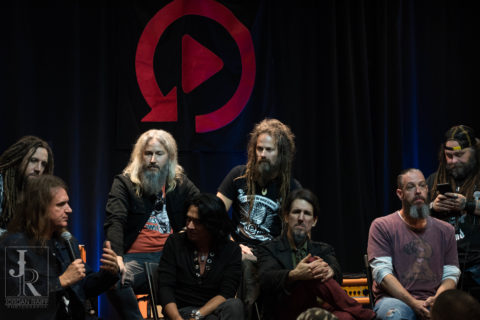
(Photo-Jordan Raiff)
Hosted by Thom Hazaert of EMP Label Group (who called the artists to the stage by singing ‘The Wedding March’); the stage welcomed bassists David Ellefson of Megadeth, Kyle Sanders of HELLYEAH, Troy Sanders of Mastodon, along with guitarists Brian ‘Head’ Welch of Korn, Steve Lynch of Autograph, Jason Bieler of Saigon Kick and Ron ‘Bumblefoot’ Thal from Guns N’ Roses and Sons of Apollo. With over 150 years of combined experience on one stage, it’s an understatement to say that this is a group of well known, highly skilled, and intelligent musicians.
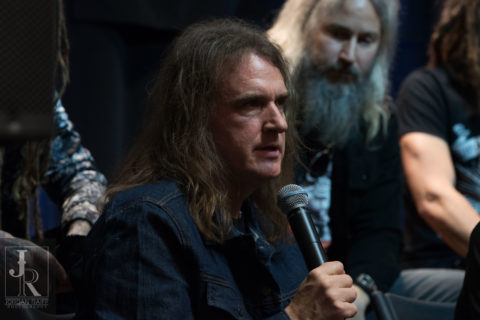
Dave Ellefson (Photo-Jordan Raiff)
Opening the floor with a general introduction and overview of who everyone is and what they have done, and who influenced them. While there were a variety of answers here, panel wide the consensus was that Gene Simmons of KISS was a large inspiration for everyone; guitarist and bassist alike. Going down the lines there were bits of anecdotes on their lives and things that they have done. Bumblefoot even admitting that he listens to a wide variety of music including lounge singers. Having done his first multi-track at six with a tape recorder, he has a wide variety of experiences. Most remarkably telling those in attendance (and with nods of agreement all around) “Everything you need you have and it is at your disposal.”
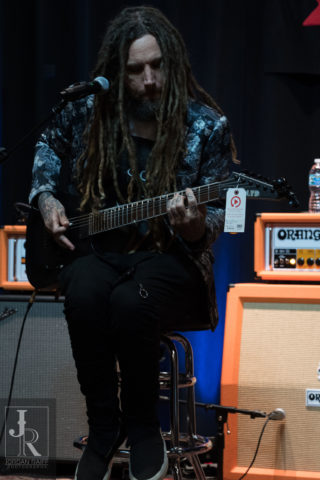
Brian “Head’Welsh (Photo-Jordan Raiff)
Opening the clinic was Head from Korn. Drawing a lot of inspiration from Rage Against The Machine in his work, he has become a legendary guitarist across many platforms. Oddly enough, he wasn’t always playing in a band with his childhood friends Fieldly, and Munky. While he did sell Munky his first electric guitar after Munky lost the tip of his finger and the doctor told him to exercise his hands, it took some time for them to play as a band together. Going on and demonstrating how he plays in his unique signature style, he uncovered that Mr. Bungle was a huge influence on the riffs he and Munky chose. Some were even ripped off in their stylistic sense as well. One of the funniest moments of the day came from his impression of Ozzy and Sharon. When Korn’s record went Gold they were on tour together, and Ozzy and Sharon brought them a bottle of champagne, and they expressed their love of the mixture of their sound with Jonathan’s vocals.
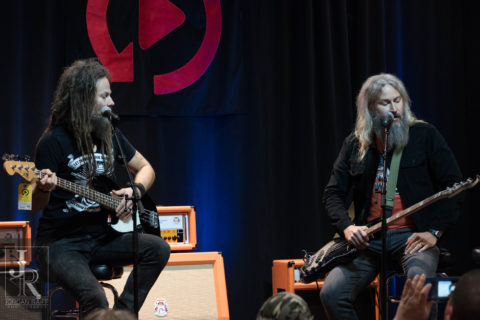
Kyle & Troy Sanders (Photo-Jordan Raiff)
Next up was Troy and Kyle Sanders of Mastodon and HELLYEAH respectively. While many people have the belief that bass can be a boring or repetitive instrument, these brothers prove otherwise. Growing up, Kyle wished Troy had played guitar so they could play in a band together. Yet Troy decided to follow in Kyle’s footsteps and picked up his bass; despite being a righty and Troy playing left handed. With their respective success and each having their own tastes in music, they both strongly agree that having a mature palate; not to stick to one style of play, or listening to only one kind of music. They still find time for their families, despite being out with their passion; touring. Maybe one day they will get their greatest wish and form the first deeply successful double bass band?
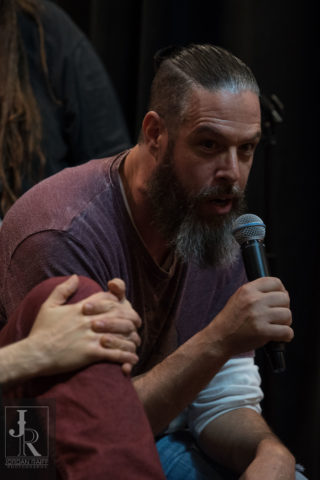
Jason Bieler (Photo-Jordan Raiff)
While Love Is On the Way is widely regarded as the unofficial song ruining places like Walgreens (something he loves to joke about), Jason Bieler wouldn’t be where he is if he didn’t focus on the pentatonic scale and half step bends. Knowing these allows someone to understand time. Which as he said “John Bonham’s tone is because he abuses where the beat is….which makes it work.” With a very simple riff based off this knowledge, he was able to write incredibly simple, yet captivating choruses. Despite his ability to take simplistic things and string them together in almost angelic ways, he has found a ‘theme’ for his own style. Something he readily admits he was ignorant of, and not realizing this made him a better guitar player. Listening to him play, his fingers glide across the strings and paint together notes much the same way a painter mixes colors to form unique hues and tones. While Saigon Kick is what brought him into fame, his knowledge of the guitar and how to play has made him into a highly regarded producer. Seeing his playing style, it’s not hard to see how influential he could be to any band’s recording.
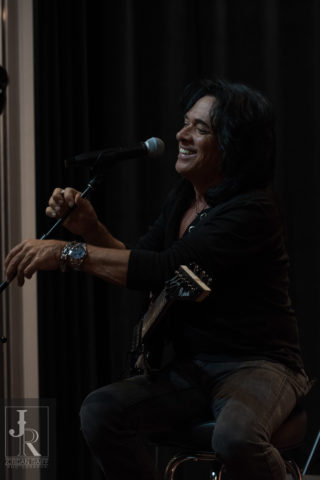
Steve Lynch (Photo-Jordan Raiff)
Turn Up the Radio is one of the most commonly heard songs in decades. From 80’s compilation albums, to radio station identification ads; if you have listened to the radio in nearly any way shape or form, you’ve heard this song and the magnificent work of Steve Lynch. Much like Jason Bieler, he believes in solid fundamentals and theory being the key to finding your best sound, and playing properly. Playing much more than talking, his mixture of tremolo and finger tapping is quite insane. If you were not to see it with your own eyes, you might think two guitarists were playing at the same time, or someone with three hands. Taking this opportunity to show people how to properly perform finger tapping as well as the legendary double tapping, he went on to explain how starting slowly and getting the feel is the key to being able to properly perform his techniques. Seeing the buildup in speed as he was giving instruction was reminiscent of the ‘how to’ VHS cassettes that were everywhere 30 years ago. That’s not to say this wasn’t a good thing; rather it gave the feel that with the right practice, and true dedication to the art that is finger tapping, anyone is capable of doing it.

Bumblefoot (Photo-Jordan Raiff)
Closing out the clinic was Bumblefoot. Best known for his time with Guns n’ Roses and Sons of Apollo, this man is truly a guitar legend. Using his phone to give background sounds to his clinic, he played along on a very unique double necked guitar; one fretted, one fretless. With a ‘warm up’ track that had a cartoonish background sound to it, his scales and riffs were nothing less than the legendary sound people come to expect from his performances. Seeing him banging his head along in time with Mozart as he played, doing a bluesy rendition of the Pink Panther theme gave a light hearted and familiar moment as you could see the faces of those in attendance light up hearing something many grew up with. While he features lots of fast tapping notes like others, he went on to explain how “Pythagoras learned how to tune” and explained how the theory of frets and tune works. How you should be able to play from both directions as all you are doing is shortening the string. Incorporating his amazing voice to sing along with his riffs at times, his clinic featured a great 7:3 mixture of lesson and examples of theory to talking. If you are more a visual learner, his clinic is definitely not one to miss.
Lasting around three hours, this clinic was not one to miss. The information, lessons, and stories contained were nothing less than perfect. Considering the price of Free.99, it’s hard to imagine getting more for your time. The stories, the knowledge shared, and examples given are something rarely found in one place. To get a collection of people with a musical knowledge of this caliber is simply unheard of.
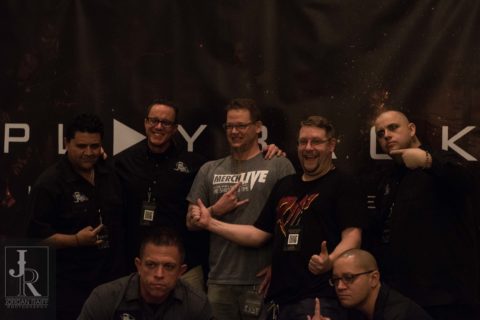
(Photo-Jordan Raiff)
Playback: Independent Music Expo
9DEC18 Westshore Grand Hotel Tampa, FL
Not to be outdone, the ‘Independent Music Expo’ brought a lot of information and opportunities to the table as well. Sponsored by Recording Academy known most notably for ‘Music Cares’ and their Grammy awards; Orange Amplifiers who brought along some of the great gear from the day before ‘all in one’ amp/cab combo OBI-300, “Rockerverb 50 MKIII” head, hooked up to their “PPC412AD” cab, and also adding in a Crush 20 practice rig. Replay Guitar Exchange, brought along a Fender Stratocaster, Jackson X Series Concert bass, and an LTD Les Paul. Also sponsoring was Dean Guitars, EMP Label Group, Combat Records, Ellefson Coffee Co., Ellefson Touring Agency, Merch Live, Concrete Marketing, KHDK Electronics, La Bella Strings, Jackson Guitars, Sinister Guitar Picks, Samson Electronics, Ace High Printing, Revolver Magazine, and BraveWords, this was truly an event supported by some of the best brands in the business. In turn, this brought some of the best musicians, producers, mixers, and special guests to the 15 different events throughout the day. Including a terrific meet and greet, a special sneak preview of Brian “Head” Welch’s new documentary Loud Krazy Love, and panels upon panels full of information, sound bites, and tales from where music was and where it is going.
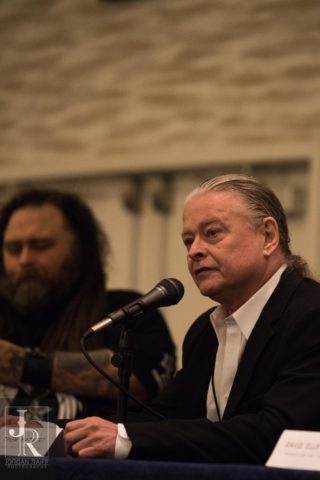
Max Norman (Photo-Jordan Raiff)
Opening the day was a panel with legendary producer Toby Wright. Equally as legendary, Max Norman opted to join in as well as they discussed engineering and production. Covering their collective knowledge formed over many years from working on albums for Ozzy, Megadeth, Jerry Cantrell, KISS, Korn and Alice in Chains. While discussing these albums, Toby was clear that he ‘didn’t care for the EP much, but the tracks still made it to #1 and are still on the radio today’ which received a collective laugh from the audience.
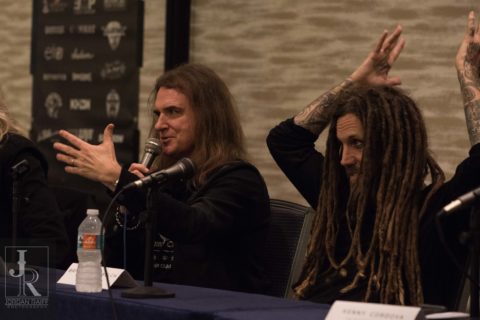
David Ellefson & Head (Photo-Jordan Raiff)
Additionally, Toby has found a love/hate relationship with the changes in music. He cannot stand MP3’s as they cut out a lot of the middle tones, yet prefers working with digital tracks over tape. Max added in quite often as well. Considering he is one of the few people to offer Dave Mustaine “brutal notes he actually took”, his opinion on an album is beyond invaluable. Talking more about how albums were recorded in the past, “mixing was a ‘performance’ in those days…..we would have 4-5 guys working on a single mix.” Considering his points about how difficult it was to get used to a band’s sound to fix tracks by noticing how each take was done and cuts were done manually and by sound. Made even more complicated by the pops and hiss of the tape. Max also offered a slightly differing view of the ‘analog vs digital’ debate. “Digital is faster and easier, but just not as ‘warm.” Additionally, he feels that analog has become a “lost art”. These days he does more mixing than producing. “Bands cannot afford to hire producers these days.” With their insights to the evolution of music, it’s not surprising that bands who can afford to hire a producer look to help a band shape their sound.
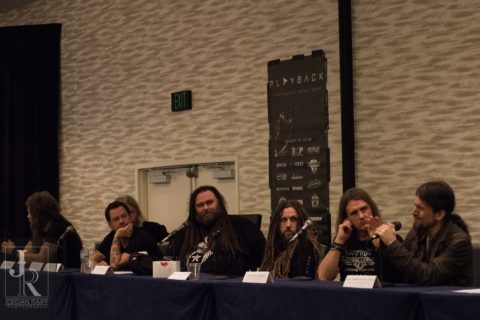
Kyle Sanders, Troy Sanders, Peter Klett, Thom Hazaert, Brian ‘Head’ Welch, Dave Ellefson, Bumblefoot (Photo-Jordan Raiff)
Yet music is still a business, and there can be horror sides to it. With the panel about “Horror Business: Inside the Record Label” you knew to expect the ugly truth. Featuring David Ellefson of Megadeth, Steve Lynch of Autograph, Bumblefoot of Guns n’ Roses, and Jason Bieler of Saigon Kick this was a panel of people that got to experience the record industry when bands gained their following off press, underground tape trading, and word of mouth. As David went on to explain a lot about the business throughout the panel. “The best records survived; others floundered so it evened out.” “This is a people industry; make them money and stay, don’t and you’re gone.” “Music is the backdrop of a generation…Greta Van Fleet is the Zeppelin of this generation. Much like Nirvana or Korn or Guns n’ Roses was for theirs.” Steve Lynch offered a different perspective on the industry but similar feelings. “Artists rely a lot on their label…After RCA screwed us on our second record we went to EMP.” Which honestly wasn’t a huge shock to hear him say. Especially when “RCA didn’t even want ‘Turn Up the Radio’ on the album, until they heard it on there. Then they said it was a good call.” This in turn got them to sell 5 million copies of the album. Bumblefoot made his views on record labels very well-known from the start “DON’T FUCKING DO IT!!!”
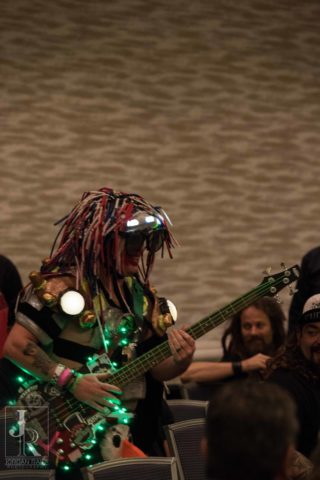
Green Jello Bassist (Photo-Jordan Raiff)
Adding in a more personal bit “People will fuck you in the ass contract or not…Surround yourself with good people, people who support your ideas” Considering he has “been on labels of all different sizes; you realize it is all personal.” The business also changes from his perspective (as everyone nodded collectively) once you get signed; it’s “when the time to work actually begins. You need to work as a team and come up with good ideas to make something great…..You have to be just as creative with everything relating to the song as you do with the song itself.” Jason Bieler seemed to view the record industry with a totally different viewpoint. “’Love is On the Way’ was the last ballad, so I killed hair metal.” The funny part about this, is that the song becoming a hit was completely unexpected. When the song broke, they were already out on the road and told “Either run with the hit or bye-bye.” Additionally “When a record is a success, it’s because the band is great. When it fails it’s because the label sucks….A great record will set you free.” There is problems that come from being signed though. He “sees bands promote their asses off until they get signed; then nothing…A label is an amplification for what a band is already doing.” Which at times is a great thing. “The biggest issues these days is that NOBODY FUCKING CARES ANYMORE!! There is too much ‘noise’ being put out.” One of the best messages from his part on the panel was simple; but able to be taken by everyone and applied to their own life. “You need to keep pushing and tell people to care; figure out your draw, and make it happen.” With how many bands perform to poor audiences, how many ‘starving artists’ are out there, and the number of people working jobs they hate just to be over broke….this statement has resonation for nearly everyone in attendance.
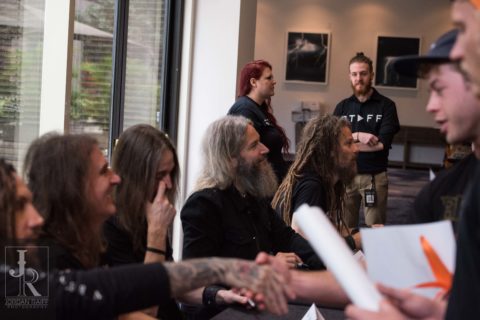
Kyle Sanders, Troy Sanders, Peter Klett, Thom Hazaert, Brian ‘Head’ Welch, Dave Ellefson, Bumblefoot (Photo-Jordan Raiff)
Brian “Head” Welch of Korn, David Ellefson and Dirk Verbeuren of Megadeth, Troy Sanders from Mastodon and Kyle Sanders of HELLYEAH sat in the hall in the traditional ‘Meet and Greet’ lineup to take pictures, shake hands, sign items, and chat with the people who came out. Watching a few people get attacked by the ‘onion cutting ninjas’ (shed a tear or two) while meeting musicians they look up to is something very personal and unique to each person. It’s a reminder why many keep on the road for years upon years; the fans. After this, Head debuted the trailer for ‘Loud Krazy Love’ and shared his perspectives on it.
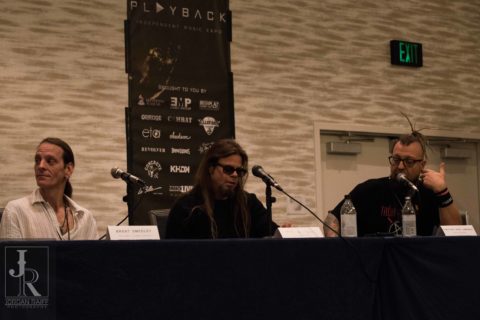
Brent Smedley, Todd La Torre, Christian ‘Opus’ Lawrence (Photo-Jordan Raiff)
One of the most anticipated panels came to follow; “Road Warriors-Tales from the Road”. With Todd La Torre of Queensryche, David Ellefson, Troy and Kyle Sanders, Head, Peter Klett (producer and original guitarist of Candlebox), Steve Lynch, Thom Hazaert and Bumblefoot on the panel, the experiences to draw from are exceptionally vast. Todd brings one of the most interesting perspectives to the table. Originally playing drums and starting in bars at 14, he always loved to sing. As luck would have it, he met Michael Wilton at NAMM and it just transitioned naturally into him getting the spot years ago. As they now get ready to head out on the road in support of their third album, (which Todd played drums on as their drummer is on paternity leave), his experience has given him a lot of lessons.
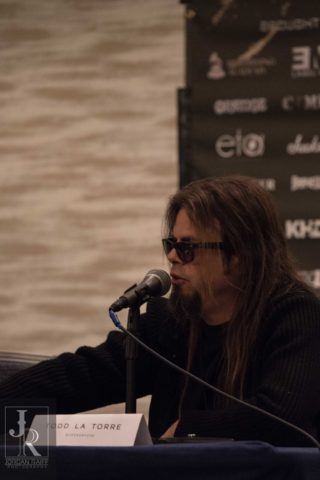
Todd La Torre (Photo-Jordan Raiff)
“Social Media cultivates a sense of entitlement….At the end of the day you should just try to be humble and be the best you can be….Not everyone is cut out to be a performer…You play for free and get paid to travel…Despite friends coming backstage and expecting hookers and cocaine everywhere, it’s just a deli tray and bunch of guys on their phones enjoying the silence. It’s what we enjoy on the road.” But his words aren’t just those of advice. He also recalls hilarious times on the road. Like the time the tour bus got stopped at the Canadian border and they found a baggie of powder in Michael Wilton’s bunk…A baggie of colon cleanser that is. Additionally he believes that “Your CD is your business card to make people want to see you” and “It’s never too late to ‘make it’ in rock.” Steve Lynch draws upon some of the more crazy points of road life. Like being chased out of a gas station while in the Deep South. As they were still in their stage clothes, they were not exactly welcome site in this small town, which as they joked if you’ve seen Autograph in their heyday, it’s not hard to see why. He also recalled a girl who had gotten on their tour bus while they were on tour with Aerosmith who broke the cardinal rule of touring. When she went to use the can a horrible, strange odor came wafting out. Needless to say the bus was stopped and she was let out. Standing there she flies both middle fingers screaming out “Fuck you Aerosmith!!” Bumblefoot’s outlook was more direct and to the point. “Make sure you have an experienced tour manager…they are THE most important person on the tour….Touring/traveling is the best education you can receive in life. You find yourself and learn all kinds of stuff you otherwise won’t.” Head finds that “having a tour manager who can do sound too can help save some serious money while out on tour.” Thom also shares a similar perspective. “Tour in a way that makes sense to you. You don’t have to tour for six months and lose your house and family because of that.”
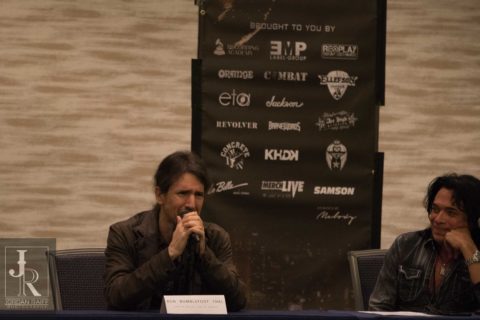
Bumblefoot (Photo-Jordan Raiff)
“Better in Dubly: The Art of Record Production” brought out Toby Wright, Mike Clink, Max Norman, Peter Klett, and Jason Bieler. Toby’s legendary experience has taught him a lot; being in the “right place at the right time” got him going in the business. In his eyes, “Performance is not as crucial now as it was when it was all on tape.” Mike on the other hand knew he wanted to make records in junior high. “I was probably the only junior high school student with a subscription to Billboard magazine.” He got his start “answering phones at the record plant on weekends, and coming in at night on my own to learn.” His first record as a producer was ‘Eye of the Tiger’ for Survivor. “A producer is necessary in a band….They offer an objective view, serve only the song, and do the best for the band.” That being said “you need to know what you want when you choose a producer. Not a list of possibilities.” He too also sees the downfalls of digital and people making a record ‘together’ from across the country. “Things happen spontaneously when you are playing together versus by satellite. You play off the space you have then….play off each and the magic will come.” Max also echoed a lot of these sentiments. “You tell the truth as a producer. That’s how you gain the needed trust.” Yet “producers are not as prominent as they were before. Nowadays artists make records when they shouldn’t and this is due to the lack of guidance a producer would provide….If you can’t make it better, you aren’t the person for it…It used to be there were 100-150 rock/metal albums a year. Now there are 10,000 a year…Nobody has a filter and it dilutes the industry.” To his credit, he’s completely accurate. “Without radio and TV guidance there isn’t a great way to steer people towards new acts and turn people on to.” While speaking volumes as to the production of a record, he also reflected back on working with Ozzy. “We only needed to do one ‘punch out’ for the bass on Blizzard of Ozz…At most it was three to four takes on anything…It makes things easier when people know their shit versus just fucking around in the studio.” Much like Mike “the producer becomes the ‘fifth member in the band’ as they try to jigsaw in there during the production.” Peter sees himself unfit to be on this panel with these legends. “Making music was a romantic process. Instead people make albums at home and put them together.” Despite watching the production on the first three albums, he wishes he had paid better attention. “Singers actually had to be good, and people have become too ‘perfect’…They need to appreciate the dirty sound of albums.” Digital has also made everything “sonically sound the same” for him as well. Jason has taken a self admittedly bizarre career path. He was “in a sub-shop before being flown literally overnight to LA to record their big record.” “I love the science behind producing…The emotion is what gets people to listen to a record.” While recording he was given some advice “Don’t produce your own record.” Advice he chose to ignore and produced their second album himself anyways. He ‘bumbled’ his way through it and learned a lot. “You cannot produce or engineer your way out of shit…better a great song done on poor equipment than shit track on great equipment.” As for the new ‘distance’ recording “Avoid a band fight by having the singer sing next to you…This creates the energy of a record that we can connect to.” One of the biggest problems in the record business is “the turnover from the top on down.” The A&R guys are replaced quickly and without longevity you never know who you are dealing with next.
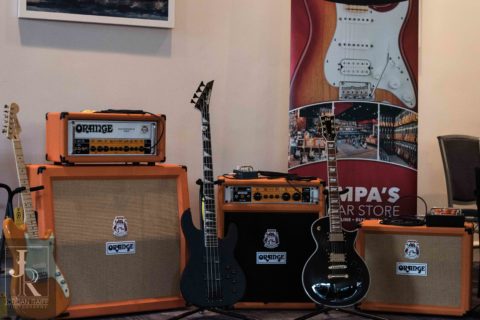
(Photo-Jordan Raiff)
“Modern Music: Marketing and Management” initially was to be a Q&A panel with Alex Auxier of Orange Amps, Thom Hazaert, David Ellefson, Bill Manspeaker of Green Jello, Bumblefoot, John Palumbo of Replay Guitar Exchange, bassist Rich Ross, and Jason Bieler. Alex being a guest on this panel was rather insightful. “Bands need to realize only a handful of people get free stuff anymore, budgets just aren’t what they once were…You need to be PROACTIVE and not REACTIVE…To get that ‘sponsorship discount’ you need to be touring.” He also shared that they are looking for the “18-25 demographic” and not to “get a label if you don’t absolutely need it.” While it might sound contradictory to what many have believed, when you hear David Ellefson tell you that both parties need to bring “Value, value, value to the table” and that “you cannot sell for a dollar tomorrow what you’ll give away for free today” you realize how accurate the statements from Alex are. He additionally suggests that “while some managers charge a flat fee, that maybe you should consider and escalating or negotiable scale.” Bumblefoot goes on to explain that there is “No need for a manager until you have something to manage…Make sure they know their shit…No percentage of your gross income, rather an equal share and commitment to produce…10%-20% is acceptable, with 15% being the goal.” John Palumbo introduced that he is “working with a national act (he did not name) to do a new sponsorship to build each other’s brands.” Additionally “A&R guys love the people at the top and bottom rungs of the ladder….Be easy to work with and go after the bands you are already seeing playing.” Bill Manspeaker…He took this panel to a whole new level. In between telling tales of ‘stalking Dave Ellefson via FB and showing up where he is” and recalling “giving cocaine, Mustangs, and Harley Davidsons to get a break” he also took a far left turn from everyone else. “I have booked 253 shows this year via Facebook on this damn thing (while holding up his iPhone). With no touring band…and by the way, if anyone here can play and wants to join us at Brass Mug tonight…” At this point in time he brought out his ‘punk rock puppet show’ to lead everyone in a chant of ‘Green Jello suxxx’. This in turn sent Jason Bieler and Rich Ross to walk off (with Rich returning shortly after). To say Bill stole the panel and made it into a 35 minute ‘Green Jello promo’ would be fairly accurate.
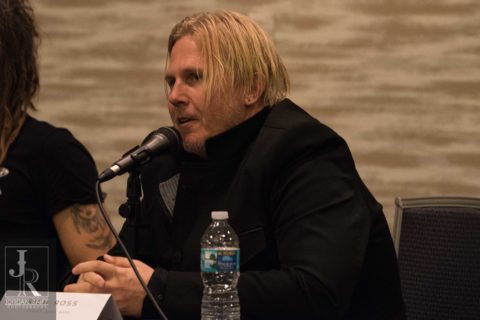
Rick Ross (Photo-Jordan Raiff)
Once things calmed down, it was time for “Gods of Thunder (bass panel)” with David Ellefson, Troy and Kyle Sanders, and Rich Ross. David has long been considered to be one of the foremost authorities on bass. “You need to try a lot and find your sound…I tried and could not find a five string bass that worked for me on “Hanger 18” so I ended up recording it in drop D tuning.” Troy Sanders follows his gut instinct initially. While he “does a lot of the lyrics and vocals for Mastodon” he knows he needs to “be a team player, and let the music come from an authentic place.” Despite his longevity in music it took him “a long time to find just the right bass and the right sound combination.” Kyle maintains similar views. “Be a team player and know your place in the band…Learn how to get along with the drummer, and be one with the drummer…Find your weakness and try to make it better.” One of the biggest things he did was during a tour in Europe. He took over as the tour manager to help cut down on costs. Sure he didn’t make any extra cash, but it meant the band wasn’t playing for free either. The hardest part for him was “finally finding my bass…A strong one since I play hard and that will keep my tone…Fine a good company with good people to work with and stick with it. As long as YOU are happy.” For him, this answer has been with Warwick basses because “They are solid wood and just feel right in my hands.” Rich Ross is a whole other level of bassist. He began playing at 14, and his approach is “To always be the best bass player at any gig he is hired for.” Considering he was found based upon his samples, and has “learned 21 songs in two days just for one show” the man has certainly been a quick and through study. “Your tune will come from your roots…study the band and find out what they need from you as the bass player.” He keeps a diverse knowledge base of the bass guitar and how to play. “Change your bass depending on who you are playing with…the note truly come off the bass, not the effects pedals.” He’s also made a name by being the ‘yes’ man; ask him to perform and he says yes. Additionally, for him “my six string days are done unless I go back to Dream Theater.”
“Axe-Men (Guitar Panel)” featured a much deeper panel of guests. Bumblefoot, Steve Lynch, Jason Bieler, James Murphy of Testament, Peter Klett, Head, Kent Smedley, and John Palumbo. Bumblefoot kicked off by talking about “playing in Albania on a keyboard amp with a broken input…having a modeling amp in my bag saved my ass…Digital is a hologram of what is out there already, but it fits in a suitcase…Always have backup equipment with you, you never know when you will need it.” Yet amps and gear aren’t everything. “My biggest accomplishment was finally getting that F chord down!!” “Learn as much as you can. Listen to all the music that inspires you, and learn from it as well…Retain as much as you can while studying, don’t multitask when practicing…There are so many distractions nowadays, avoid them as much as you can.” While Steve Lynch echoes much of this sentiment “take a good bit from everybody, but make your own sound…music education expands your boundaries.” He also avoids listening to other guitar players to avoid influences on his style, and hates reading notes. Additionally, he jokes that George Lynch is actually his ex-wife. Jason Bieler started out with simple rigs as that was all he could afford. “The sound is not in the after effects but in your hands.” He does admit that he likes having specific gear and “MIDI control is an amazing thing.” Yet “My happiest guitar sound has yet to happen…Don’t wait until later to fix your sounds. That is a disaster waiting to happen.” James Murphy has had his moment. When Michael Schenker told him he got the guitar right on ‘Sails of Charon’ one year at NAMM he knew he had done it. He does believe “Real artists color their work, and your pedals are the sonic colors…Commit to YOUR sound.” Peter Klett talked of “Playing along with sounds on the radio.” He is “inspired by others but doesn’t copy them. Find your own sound.” His happy moment came from when he got his first electric guitar after proving to his parents he was serious. Additionally while touring with Metallica, EVERYONE BUT KURT told him how much they loved his sound. Head’s happy moment was being able to let go of his “PB Mystic to Munky for an extra 100 bucks so I could get my dream Charvel like George Lynch.” Considering how deeply influential his sound has been to countless 18-40 year olds, most people would be happy Munky paid the extra for that guitar. Kent Smedley has his album getting finalized right now and will be out “soon.”
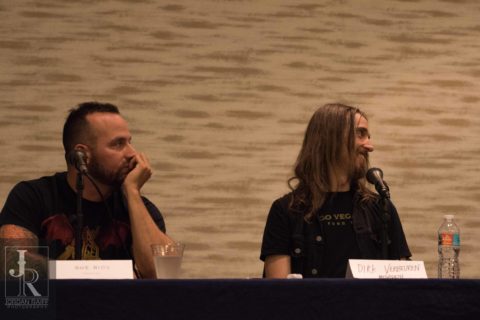
Gus Rios, Dirk Verbeuren (Photo-Jordan Raiff)
“Heavy Hitters (Drum Panel)” brought out Brent Smedley of Iced Earth, Dirk Verbeuren, Todd La Torre, Open of Dead by Wednesday, and Gus Rios of Gruesome. Brent got his start in drums with his brother Kent from a “Disabled US Army Veteran from Vietnam who lived down the street.” Granted he like many others always wished to be out front. Dirk played violin and did vocals while growing up in Belgium. He also tried piano and guitar but they never stuck. “At 11 Dad’s colleague got I a copy of ‘License to Ill’ and those beats just stuck.” The family moved to France, and he was introduced to metal music, it just stuck. “I beat on cardboard boxes, and whatever was around until dad finally got me a drum kit.” Todd initially started out playing guitars at 10. When that just didn’t hit the mark, he swapped over to drums at 13. “Patterns and rhythms are consistent and everywhere. From windshield wipers to turn signals.” One of the biggest tips he offered to drummers is to “Rely on your ears in a big way.” This has allowed him to contribute greatly to three albums from Queensryche. He hears the lyrics similarly to how he sees the drums. “It’s so easy to add, but it takes so much more to pull back and hold off.” Despite being the lead singer of Queensryche, “I’m not a spotlight guy in my normal life…The transition from drummer to lead singer was a bit hard. There is no shield up there.” Opus initially started off in a rap/rock fusion band by learning “How to play a groove from a singer for 3.5 minutes with no cymbals or fill.” By learning this and through his years of experience, “In a few hours I can teach someone a simple beat if they have natural rhythm.” Gus on the other hand took a less direct route. “At 9 I started playing a guitar I shared with my bother and stuck with it. By 12 I had found a kid at school who had a drum kit…I befriended him just to be able to play on it. Little did I know what a piece of shit it was…By the end of that first day I knew this was ‘it’.” As his drum career has progressed he has learned “Drums dictate the ebb and flow of the song…Slayer’s ‘Raining Blood changed everything for me, and it has yet to be topped.”
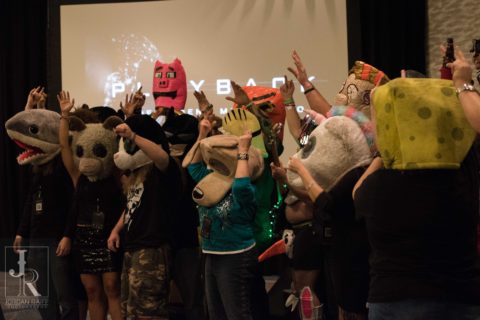
Green Jello promo (Photo-Jordan Raiff)
“Win Some Lose Some: Award Winning (and Nominated) Albums and the Guys Who Made Them was also combined with “Save the Music: The Importance of Music Education. Bringing back Mike Clink (8-10 nominations, no wins), Dave Ellefson (12 nominations, 1 win), Toby Wright (10 nominations, two wins), Troy Sanders (four nominations, no wins), Head (six nominations, two wins), Kenny Cordova of the ‘Recording Academy’, and Lee Whitmore of ‘Grammy Music Education Coalition’. Mike’s experience has been instrumental to the success of many albums. Despite no Grammy wins, he has gone Platinum over 100 times. “It is bad luck to say that your album is going to win a Grammy. ‘This is going to win a Grammy’ gives your album that curse.” He firmly believes that if “You don’t quit, and you don’t try just to win a Grammy, you have a chance.” When Mike joined the Academy, it was “To better serve the community…aiming to protect the health and wellbeing of people in the industry through ‘Music Cares’…The Academy is the ONLY organization with the artist’s best interests being their greatest care.” David believes Megadeth has “Won the popular vote but lost the electoral vote” in the past. “The Grammy is the gold standard…It’s not the ‘why’ but the cherry on top.” Yet this is not something he has always been around. “Art and music programs are important to stay since they give opportunities for kids to dream about growing in music.” As Dave grew up on farms in Minnesota, he understands how difficult getting that exposure can be for kids, especially in rural areas. “Stay small, and stay ‘stupid’. Always stay learning.” Troy like many others from rural America had “No music groups in schools. I was in an outside chorus though.” Kenny Cordova brought something special to this panel. Talking about ‘Music Cares’ he identified that they are a charity that gives to people in the music industry. Not just artists, but managers, touring help, anyone involved. “From dental care, to rehab, to covering what insurance won’t…No one is turned down as long as they show they are trying to make a career in music. Last year $480,000 was given out to help the victims of the hurricanes here in Florida.” To say that ‘Music Cares’ is a big organization is an understatement. The truly touching thing was watching Head’s reaction to this news. It was as if he had never been told about this, and knew who this could help. Lee is a part of a new initiative. “I got to know David and Thom while starting new goal of having student making music every day at school.” Making references throughout to the work from Nina Krause from Northwestern, it is easy to see why having music can be so important in the schools for children in being able to learn new information and retain it.
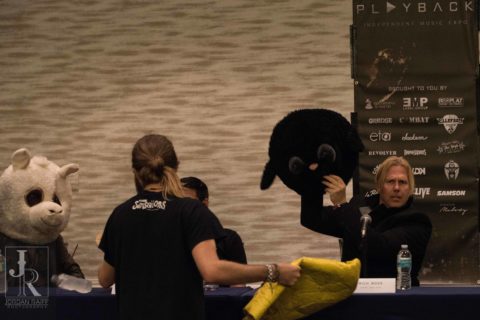
Bumblefoot (as sheep), Peter Klett, random employee in front of table, Rich Ross as ‘ba ba Black Sheep’ (Photo-Jordan Raiff)
Closing out the day was the “Classic Albums” panel. With Thom Hazaert, David Ellefson, Mike Clink, Max Norman, Toby Wright, Head, and Bobby Steele of The Misfits and The UnDead. “Destruct and record” was the method of the day for recording when Dave Ellefson started off. “My greatest teachers have been my producers.” This in part may have been due to issues with the albums. “Countdown to Extinction was excruciating to make…Dystopia had the bass recorded first in the quick track.” Yet “Time and money will always expand to the budget and time given.” Mike went on to explain “Rest in Peace was incredibly challenging to make on analog…Imagine making music when you can’t see it.” Max chimed in “We had the ability to tune things, but only in two tracks…It’s like listening to something louder, and it sounding flatter.” Yet Head had the best hilarity of this panel. “One night we ordered a pizza and cut out the center to make our own gold record.” Additionally he sees the value in production. “Your favorite bands would sounds like ass if they didn’t have good producers…Tune your guitar standing if you play standing; sitting if sitting.” Bobby Steele ended up in The Misfits by “Placing an ad in the paper that read ‘seeking band with management and record deal.’ Danzig replied. Danzig lied.” They decided to record an “Album turned up to 11 because we didn’t know what we were doing…Things happened by accident.” He found his sound then and still now heavily influenced by the input from producers. After leaving The Misfits he formed The UnDead. Currently they are on the 30th anniversary of the Misfits album. A two disk set is coming out; one with the original tracks, one with guests on the songs.
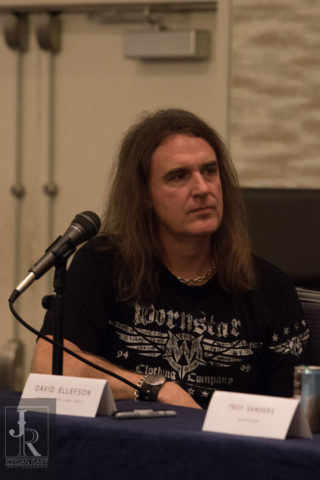
David Ellefson (Photo-Jordan Raiff)
This was the first time Tampa has hosted a music expo of this caliber, and quite frankly shows that it is capable of putting on another. With such a diverse rock/metal scene, a collection of places to play, and a population chock full of artists it truly is amazing at who lives near here. While watching these panels and listening to the stories, if you looked around the room more often than not you would see people not currently on a panel sitting in the audience and soaking up what the others had to say. Not texting on their phones, or walking in and out. Just listening and learning from each other. This is something the music industry as a whole needs more of, and humanity too. If you see any of these artists on the bill to perform or speak near you, go check them out. I can guarantee without a shadow of a doubt you will come out with more knowledge than you went in with.
Tags: alice in chains, Bill Manspeaker, bumblefoot, Dave Mustaine, david ellefson, Dirk Verbeuren, Guns n’ Roses, Hellyeah, Jason Bieler, Jerry Cantrell, John Bonham, John Palumbo of Replay Guitar, KISS, korn, Kyle Sanders, Mastodon, Megadeth, Ozzy, sons of the apollo, Steve Lynch, Thom Hazaert, Troy Sanders





 Tweet This
Tweet This Share on Facebook
Share on Facebook Digg This
Digg This Bookmark
Bookmark Stumble
Stumble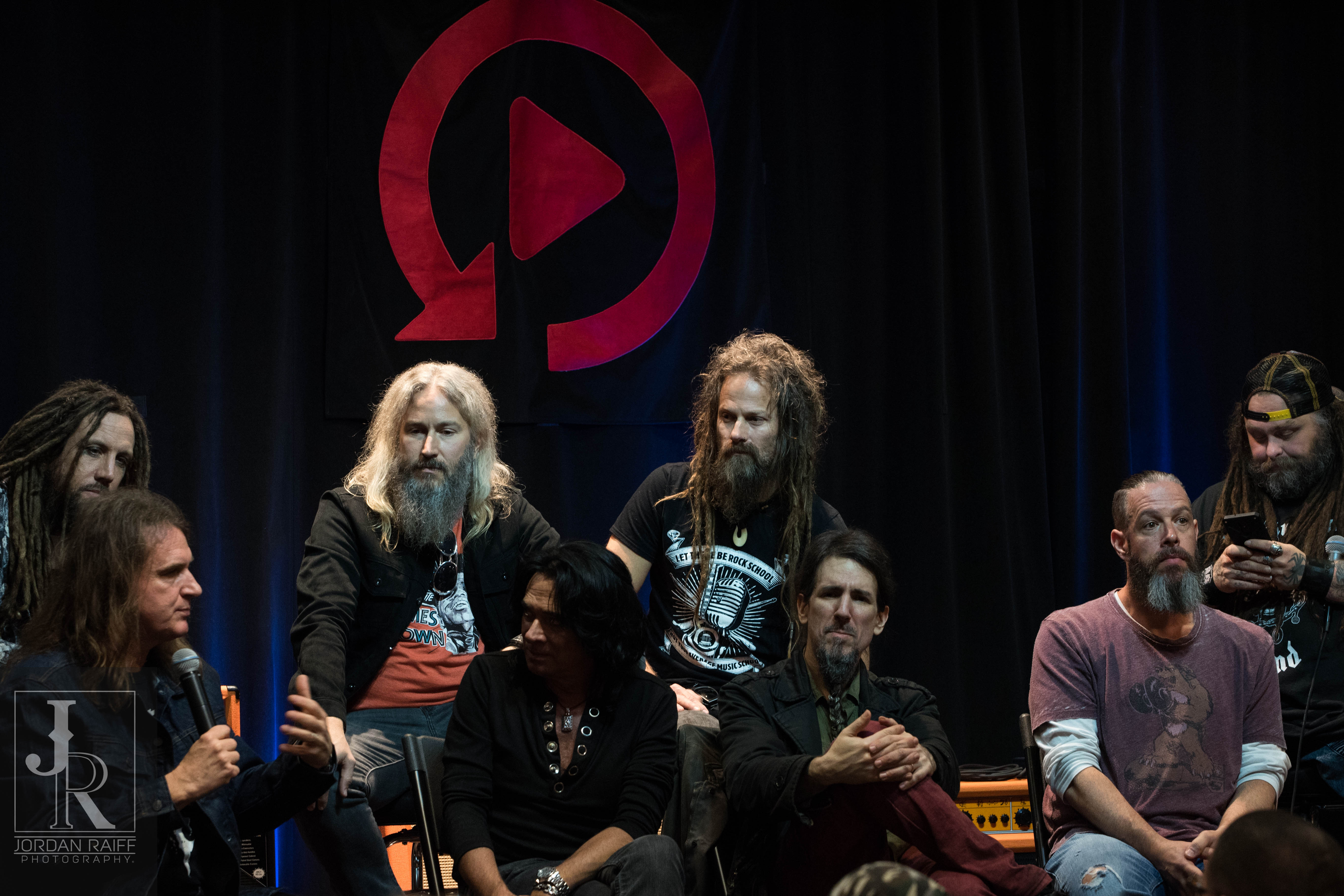





0 Comments
You can be the first one to leave a comment.